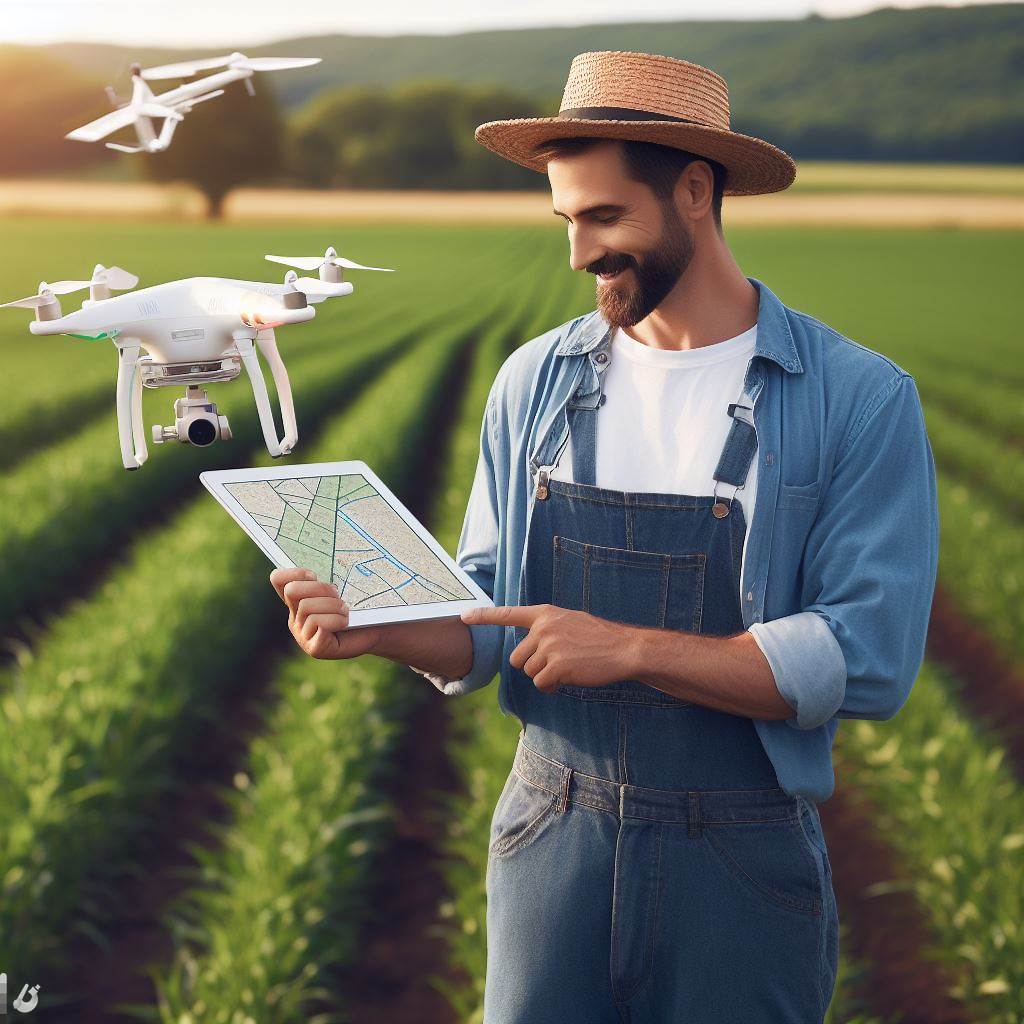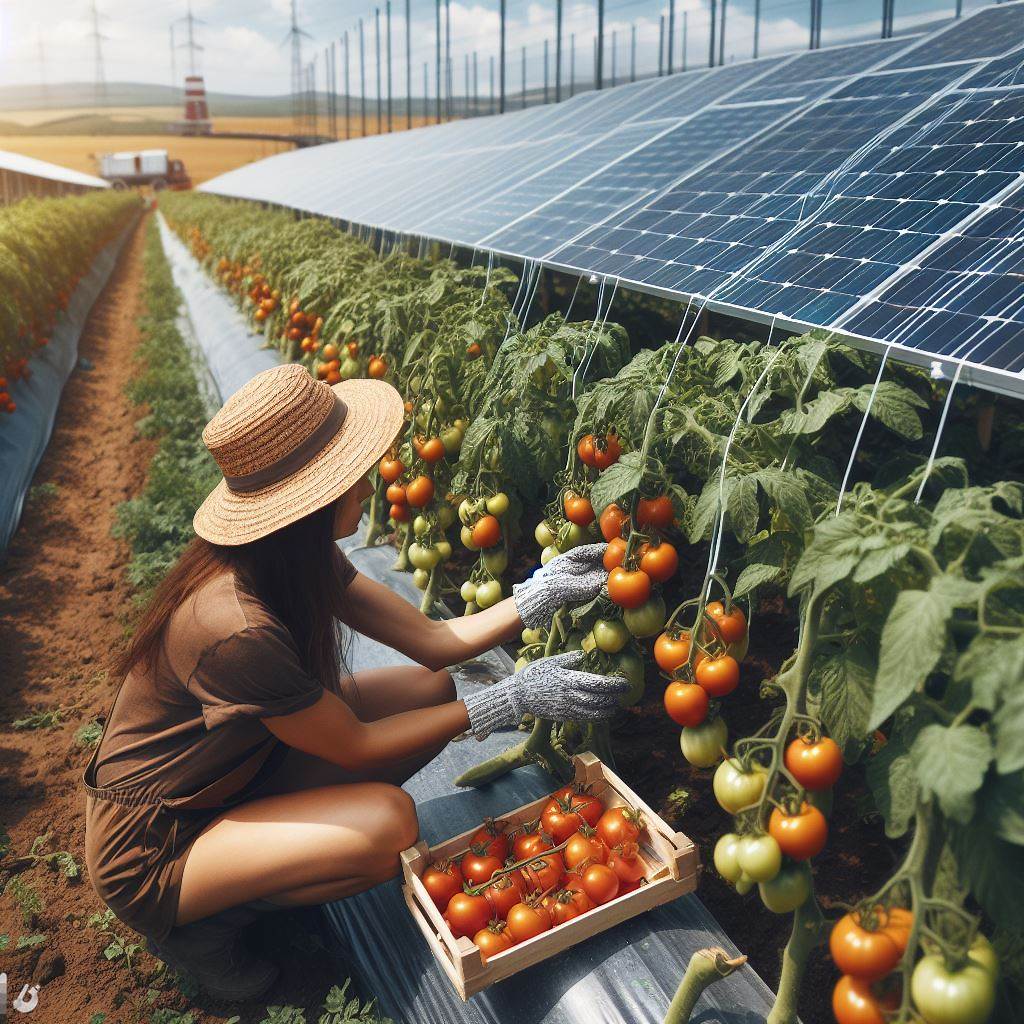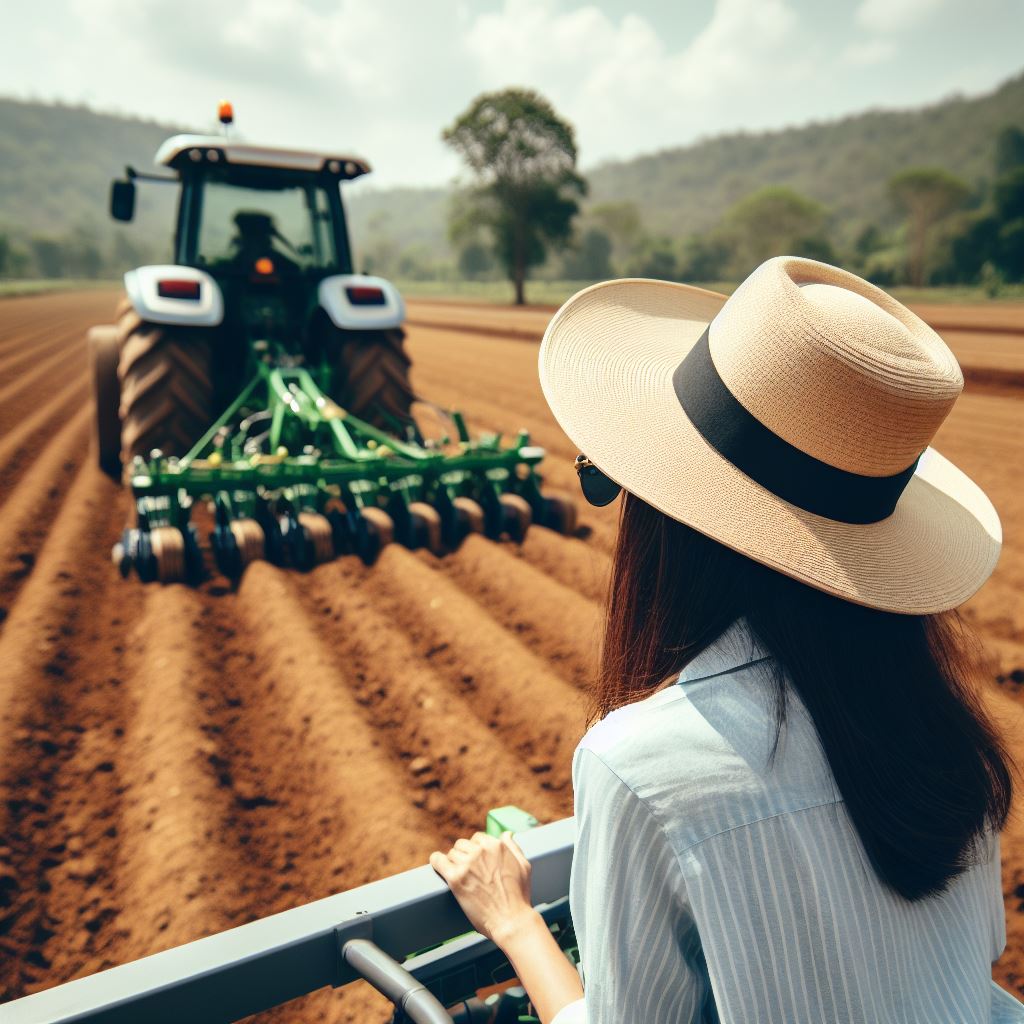Introduction
Agri-drones have revolutionized farming, completely transforming the traditional methods used in agriculture.
With their advanced capabilities and cutting-edge technology, these drones have had a significant impact on the farming industry.
The significance of this technology is evident in how it has changed the face of farming.
Agri-drones, soaring above fields, aren’t just gadgets; they’re transformative forces reshaping the agricultural landscape.
- Precision Farming: Drones revolutionize crop monitoring, ensuring precise irrigation and fertilization, optimizing resources.
- Pest Control: Swift and agile, drones can disperse targeted pesticides, minimizing environmental impact and maximizing efficacy.
- Crop Health Assessment: Drones equipped with sensors detect early signs of plant diseases, enabling prompt intervention.
This technology not only enhances efficiency but also propels sustainability, making agri-drones the vanguard of modern farming.
What are Agri-Drones?
The agricultural industry has experienced a technological revolution, with agri-drones gaining attention for transforming farming practices:
- Agri-drones, designed for farming, use advanced sensors and cameras for data collection.
- Mapping drones capture high-resolution images, creating accurate maps for farmers.
- Spraying drones efficiently apply fertilizers or pesticides with precision, reducing chemical use and targeting specific areas.
- Features like thermal imaging and multispectral cameras aid in detecting crop issues and providing valuable insights.
- Agri-drones autonomously collect and monitor large areas, saving farmers time and offering real-time, actionable information.
In fact, agri-drones revolutionize farming by enhancing productivity, efficiency, and sustainability through advanced technology and capabilities.
Advantages of Agri-Drones in Farming
Agri-drones are revolutionizing the agricultural industry, bringing forth numerous advantages that enhance efficiency, productivity, data analysis, and crop management.
With the ability to collect data, monitor crops, and apply fertilizers and pesticides precisely, agri-drones are changing the face of farming.
1. Improved Efficiency and Productivity
Agri-drones play a crucial role in boosting farming operations’ efficiency and productivity.
With their autonomous capabilities, they can cover large areas of land quickly, reducing the time and effort required for manual labor.
By integrating advanced technologies like GPS and imaging sensors, agri-drones can perform tasks such as field surveys and crop monitoring, which traditionally demanded extensive human resources.
This drives a significant reduction in labor costs while increasing the overall efficiency of farming operations.
2. Precision Agriculture through Data Collection and Analysis
One of the key benefits of agri-drones is their ability to collect and analyze vast amounts of data for precision agriculture.
Equipped with high-resolution cameras and multispectral sensors, these drones can capture detailed imagery of crops and fields.
Transform Your Agribusiness
Unlock your farm's potential with expert advice tailored to your needs. Get actionable steps that drive real results.
Get StartedThrough aerial surveys, agri-drones gather valuable information about plant health, soil conditions, water levels, and crop growth.
This data collection enables farmers to make informed decisions regarding irrigation, fertilization, and pest control strategies, leading to optimal resource allocation and yield improvement.
3. Crop Monitoring and Plant Health Assessment
Agri-drones offer unparalleled capabilities when it comes to crop monitoring and plant health assessment.
With their aerial perspective and advanced imaging technologies, these drones can detect early signs of plant diseases, nutrient deficiencies, or pest infestations.
By identifying and addressing these issues promptly, farmers can prevent the spread of diseases, reduce crop damage, and increase overall yield.
The timely intervention made possible by agri-drones ultimately enhances crop quality and improves the sustainability of farming practices.
4. Precision Application of Fertilizers and Pesticides
Agri-drones excel in the targeted application of fertilizers and pesticides, leading to significant cost savings and environmental benefits.
By integrating mapping and data analysis software, drones can create accurate field maps.
These maps help identify specific areas requiring fertilizers or pesticides.
Agri-drones equipped with sprayers or granule dispensers can precisely apply these substances to the identified areas, reducing wastage and minimizing negative impacts on non-target areas.
Moreover, agri-drones can adapt in real-time to changing crop conditions, adjusting the application rates and patterns accordingly.
This level of precision ensures effective pest control and optimized nutrient distribution, enhancing crop health and reducing the environmental footprint of agriculture.
In short, the advantages of agri-drones in farming are undeniable.
These aerial tools improve efficiency, enable precision agriculture, enhance crop monitoring, and aid in the precise application of fertilizers and pesticides.
As technology continues to advance, the potential for agri-drones to transform the agricultural sector grows, offering farmers new possibilities for sustainable and profitable farming.
Read: Vertical Farming: The Rise of Urban Agriculture
Challenges and Limitations of Agri-Drones
Agri-drones have gained significant attention in the agriculture industry due to their potential to revolutionize farming practices. ]
However, their adoption is not without challenges and limitations that need to be overcome for widespread implementation.
In this section, we will discuss some of the common challenges faced in the adoption of agri-drones, explore the limitations of current agri-drone technology, and address concerns related to privacy and legal regulations.
1. Common Challenges in the Adoption of Agri-Drones
- Lack of awareness and education about agri-drone technology among farmers.
- High initial investment costs for purchasing and operating agri-drones.
- Technical complexity and the need for skilled operators to handle the drones effectively.
- Unpredictable weather conditions impacting the performance and safety of agri-drones.
- Difficulties in integrating agri-drones with existing farm management systems.
- Limited availability of reliable and efficient support infrastructure for maintenance and repairs.
Addressing these challenges requires collaborative efforts from agri-drone manufacturers, government agencies, and agricultural institutions to provide training programs, financial assistance, and technical support to farmers.
2. Limitations of Current Agri-Drone Technology
- Short flight time and limited battery capacity of agri-drones reduce their operational efficiency.
- Limited payload capacity restricts the types of sensors and equipment that can be carried.
- Drone size limitations may not cover large agricultural areas efficiently.
- Lack of advanced AI algorithms to analyze the vast amount of data collected by agri-drones.
- Inadequate image resolution and accuracy of sensors may affect the precision of data analysis.
- Challenging navigation in complex farm environments with obstacles such as trees or buildings.
Overcoming these limitations requires continual research and development in battery technology, miniaturization of sensors, advancements in artificial intelligence, and improved obstacle detection and avoidance systems.
3. Privacy and Legal Regulations
The use of agri-drones raises concerns about privacy infringement and compliance with existing legal regulations.
- Privacy concerns arise from the collection of aerial imagery that may inadvertently capture neighboring properties.
- Farmers and drone operators need to obtain necessary permits and licenses to fly drones legally.
- Integrating agri-drone data with existing farm management systems must comply with data protection laws.
- Regulations regarding flight altitudes, no-fly zones, and flight permits vary among countries and regions.
Addressing privacy and legal concerns involves establishing guidelines, creating awareness among stakeholders, and collaborating with regulatory authorities to ensure responsible and ethical use of agri-drones.
In essence, while agri-drones have the potential to revolutionize farming practices, their adoption is accompanied by challenges and limitations.
Showcase Your Farming Business
Publish your professional farming services profile on our blog for a one-time fee of $200 and reach a dedicated audience of farmers and agribusiness owners.
Publish Your ProfileOvercoming these challenges and improving agri-drone technology requires collaboration, research, and adherence to privacy and legal regulations.
Only by doing so can agri-drones truly change the face of farming.
Read: Hydroponics: Soil-Free Farming Tech Trends

Case Studies: Real-Life Examples
In this section, we will present case studies where agri-drones have been successfully implemented in different farming scenarios.
Case Study 1: Drone-Assisted Precision Agriculture
- Farm Location: XYZ Farms
- Crop: Wheat
- Objective: Improve crop monitoring and yield estimation
Outcome and Benefits
- Agri-drones captured high-resolution aerial imagery to monitor crop health.
- Identified nutrient deficiencies and pest infestations at an earlier stage.
- Allowed farmers to apply targeted treatments, reducing chemical usage by 30%.
- Precise yield estimations helped optimize harvesting schedules, resulting in increased overall production.
Case Study 2: Enhanced Irrigation Management
- Farm Location: ABC Vineyards
- Crop: Grapes
- Objective: Efficient water management and stress detection
Outcome and Benefits
- Agri-drones equipped with thermal cameras monitored plant temperature and detected water stress.
- Data analysis provided insights into irrigation needs, optimizing water usage by 25%.
- Early identification of areas with insufficient water supply prevented crop loss.
- Enhanced vineyard management resulted in higher-quality grape yields and increased profitability.
Case Study 3: Precision Crop Spraying
- Farm Location: PQR Plantations
- Crop: Rice
- Objective: Reduce pesticide usage and improve spraying accuracy
Outcome and Benefits
- Agri-drones equipped with spraying systems precisely targeted areas affected by pests and diseases.
- Reduced pesticide usage by 40% due to accurate application and avoidance of non-affected areas.
- Drastically reduced labor costs and minimized human exposure to harmful chemicals.
- Improved crop health and minimized crop loss led to increased profitability for the plantation.
Case Study 4: Livestock Monitoring
- Farm Location: LMN Ranch
- Animals: Cattle
- Objective: Remote monitoring of animal health and behavior
Outcome and Benefits
- Agri-drones with thermal imaging cameras tracked cattle movement and identified sick or injured animals.
- Early detection of health issues resulted in timely veterinary intervention, reducing mortality rates.
- Monitoring grazing patterns enabled better pasture management and prevented overgrazing.
- Enhanced livestock monitoring improved overall animal welfare and increased ranch productivity.
These real-life case studies demonstrate the successful implementation of agri-drones in various farming scenarios.
The outcomes and benefits include improved crop health, optimized resource management, reduced costs, and increased profitability.
By harnessing the power of agri-drones, farmers are revolutionizing traditional agricultural practices and embracing the future of farming.
Read: Hydroponics: Soil-Free Farming Tech Trends
Future Perspectives and Potential Developments
Agri-drones have already shown immense potential in revolutionizing the farming industry, but their true impact is yet to be fully realized.
As technology continues to advance at an unprecedented pace, emerging trends and advancements in agri-drones are constantly being explored.
These developments hold immense promise for the future of farming.
1. Emerging Trends and Advancements in Agri-drones
- Autonomous Farming: Future agri-drones will possess advanced AI capabilities, enabling them to perform tasks autonomously.
- Precision Agriculture: Agri-drones equipped with sensors and imaging technology will provide real-time data, optimizing crop management.
- Pest and Disease Detection: Through advanced imaging techniques, drones will detect diseases and pests before they become detrimental to crops.
- Irrigation and Fertilization Management: Drones will analyze soil data and deliver precise amounts of water and fertilizer, maximizing resource efficiency.
- Crop Monitoring: Aerial monitoring will allow farmers to identify crop stress, nutrient deficiencies, and ensure timely interventions.
2. Potential Developments in Agri-drone Technology
- Swarming Technology: Collaborative agri-drone networks will work together to cover larger areas efficiently, increasing productivity.
- Payload Innovation: Drones will have the ability to carry out various agricultural tasks, such as planting seeds or crop dusting.
- Improved Battery Life: Longer flight times will enhance the capabilities and feasibility of agri-drones for extensive farming operations.
- Weather Adaptability: Future agri-drones will be designed to withstand adverse weather conditions, enabling year-round operations.
- Integration with Other Technologies: Agri-drones will be seamlessly integrated with IoT, machine learning, and big data analytics, enhancing their capabilities.
3. Potential Impact of Agri-drones on the Future of Farming
- Increased Efficiency: Agri-drones will optimize operations, reduce manual labor, and enhance overall farming efficiency.
- Cost Reductions: Precision agriculture and automation will minimize resource wastage and lead to cost savings for farmers.
- Environmental Benefits: By precisely applying resources and monitoring crops, agri-drones can minimize chemical usage and reduce environmental impact.
- Enhanced Crop Yields: Advanced monitoring and timely interventions will result in healthier crops and increased yields.
- Global Food Security: Agri-drones can facilitate large-scale farming and help meet the growing global demand for food.
In general, the future of farming holds countless possibilities with the continuous development and integration of agri-drones.
These unmanned aerial vehicles have the potential to revolutionize the industry, bringing forth a new era of precision agriculture and sustainable farming practices.
As emerging trends and advancements continue to shape the technology, farmers can look forward to increased efficiency, reduced costs, and a brighter future for our food supply.
With the potential impact of agri-drones, the face of farming is on the verge of a remarkable transformation.
Read: Vertical Farming: The Rise of Urban Agriculture
Learn More: Farm Bots: Revolutionizing Animal Feed
Conclusion
In closing, agri-drones have revolutionized farming practices with their numerous benefits.
They have enhanced efficiency, precision, and data collection. Agri-drones also minimize the use of chemicals and improve crop yields.
The significance of agri-drones cannot be understated, as they not only save time and labor but also reduce costs and minimize environmental impacts.
Farmers can now monitor their crops with ease and make accurate decisions for better crop management.
It is crucial for farmers and agricultural practitioners to explore the possibilities agri-drones offer.
By integrating agri-drones into their farming operations, they can optimize their processes and increase productivity.
They can also boost resource efficiency and reduce the risks associated with traditional farming methods.
Agri-drones have the potential to transform the future of agriculture, making it smarter and more sustainable.
Embracing this technology can lead to improved farming practices, increased yields, and better resource management.
Therefore, I encourage all readers to consider adopting agri-drones and explore their benefits.
With the potential to revolutionize farming, agri-drones offer a promising future for the agriculture industry.
Let us embrace this technological advancement and shape the future of farming.




